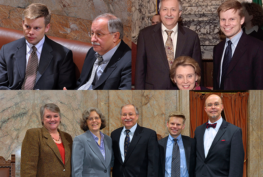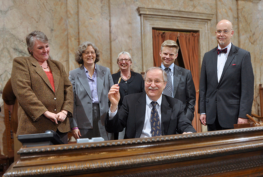Dear friends and neighbors,
Our legislative district includes some of the most complex transportation challenges in the entire state. During this year’s legislative session, I worked to secure funding to keep the SR 520 project moving forward and make several other investments in transportation infrastructure to improve safety, mobility, economic vitality and sustainability.
SR 520 project moving forward
Declining gas tax revenues combined with recent high inflation left our 2023-25 transportation budget badly out of balance. Projects around the state are getting more expensive while revenues to pay the bills are declining. While we continue to work on long-term solutions, I am pleased to report that the Legislature approved additional funding to keep the SR 520 Portage Bay Bridge and Roanoke Lid Project on track. Rather than delaying and risking even greater cost increases, the budget ensures that the project will remain on schedule to be complete by 2031. The new Portage Bay Bridge will be seismically resilient, will improve bus and carpool travel, and will include an extension of the SR 520 Trail. It will also mean that 25 years of construction will come to an end for our neighbors in Montlake. Just this week, some of the 2 million pounds of dirt arrived for the future Montlake lid (pictured above).
Statewide transportation improvements
In 2022, the Legislature approved the greenest transportation package in state history. The $17 billion “Move Ahead Washington” package includes cleaner, more efficient transportation options along with funding for highway and bridge maintenance. With new revenue from the state’s Climate Commitment Act, the 16-year package is already providing historic investments in transit – including free transit for everyone 18 and younger, safer bike and pedestrian facilities, the removal of fish passage barriers along state highways, and the electrification of ferries and cars. Just this week, new rebates were announced to help lower-income drivers afford electric vehicles.
This year’s supplemental budget focused on maintaining that progress while also strengthening our state’s ferry system and addressing growing safety concerns on our roads. Here is a look at a few of the new investments in this year’s budget:
- $196 million – all money from the Climate Commitment Act – goes directly toward efforts to build new hybrid electric ferries and projects related to strengthening Washington’s existing fleet.
- $16.5 million to hire additional ferry crew, dispatch and service planning staff.
- $15.7 million for grants to transition diesel school buses and other student transport vehicles to zero emissions vehicles.
- $8.5 million to the Washington Traffic Safety Commission for enhanced public education and enforcement efforts and to increase grants to local jurisdictions and community-based organizations for projects such as improving bike, pedestrian, and school zone safety.
- $5 million to help King County Metro transition to an electric bus fleet.
- $3.1 million to expand water taxi service in between Seattle and Vashon Island.
- $2 million to evaluate and identify geographical locations across urban and rural settings to implement wrong-way driving prevention strategies.
- $1 million for a multi-faceted approach to supplement existing funding targeted at impaired driving and other enforcement, including additional high visibility enforcement and tribal traffic safety support.
- $1 million for WSDOT to develop a highway speed safety camera pilot program to test two or three automated traffic safety cameras on state highways.
- $500,000 to plan and begin preliminary engineering necessary to advance wildlife corridor projects in preparation for federal grant opportunities.
Thanks for taking the time to read my newsletter. If you missed my previous updates on gun safety, public education, environmental protections, affordable housing, LGBTQ+ rights, or public safety, they are available on my website. Please reach out with any questions at Jamie.Pedersen@leg.wa.gov.
Best wishes,
Jamie




